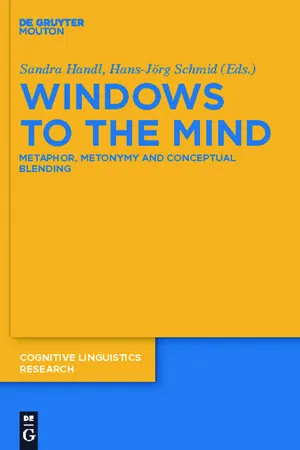
Windows to the Mind
Metaphor, Metonymy and Conceptual Blending
- 323 pages
- English
- PDF
- Available on iOS & Android
Windows to the Mind
Metaphor, Metonymy and Conceptual Blending
About this book
Cognitive linguists are convinced that the nature of linguistic structures is strongly influenced by the way we experience and perceive the world and by how we conceptualize and construe these experiences and perceptions in our minds. At the same time, the study of linguistic structure and usage is credited with the potential to open windows to how our minds work. The present volume collects papers investigating linguistic phenomena that reflect the key cognitive processes of metaphor, metonymy and conceptual blending, which have proven to be highly influential in linguistic conceptualization.
Theoretical and methodological issues, such as metaphor identification and the relevance of the target domain for children's understanding of metaphor, are focused on in the first section. The second and third parts are devoted to the application of the theoretical frameworks of the conceptual theory of metaphor and metonymy and the theory of conceptual blending to linguistic data. The contributions critically explore the explanatory potential of these theories, build bridges between them, link them with other approaches and notions (such as construction grammar, common ground and stance/evaluation), and uncover conceptual regularities and cognitive models that underlie and shape our language use in specific domains. The linguistic structures under consideration span the range from compounds and premodified noun phrases to constructions and texts such as jokes and political speeches. Methods applied include psycholinguistic experiments, analyses of data culled from authentic language corpora and discourse-analytical approaches.
Frequently asked questions
- Essential is ideal for learners and professionals who enjoy exploring a wide range of subjects. Access the Essential Library with 800,000+ trusted titles and best-sellers across business, personal growth, and the humanities. Includes unlimited reading time and Standard Read Aloud voice.
- Complete: Perfect for advanced learners and researchers needing full, unrestricted access. Unlock 1.4M+ books across hundreds of subjects, including academic and specialized titles. The Complete Plan also includes advanced features like Premium Read Aloud and Research Assistant.
Please note we cannot support devices running on iOS 13 and Android 7 or earlier. Learn more about using the app.
Information
Table of contents
- Table of contents
- List of contributors
- Introduction
- Part I: Metaphor and metonymy: Fundamental issues
- Part II: Metaphor and metonymy: Usage-based investigations
- Part III: Conceptual blending
- Index